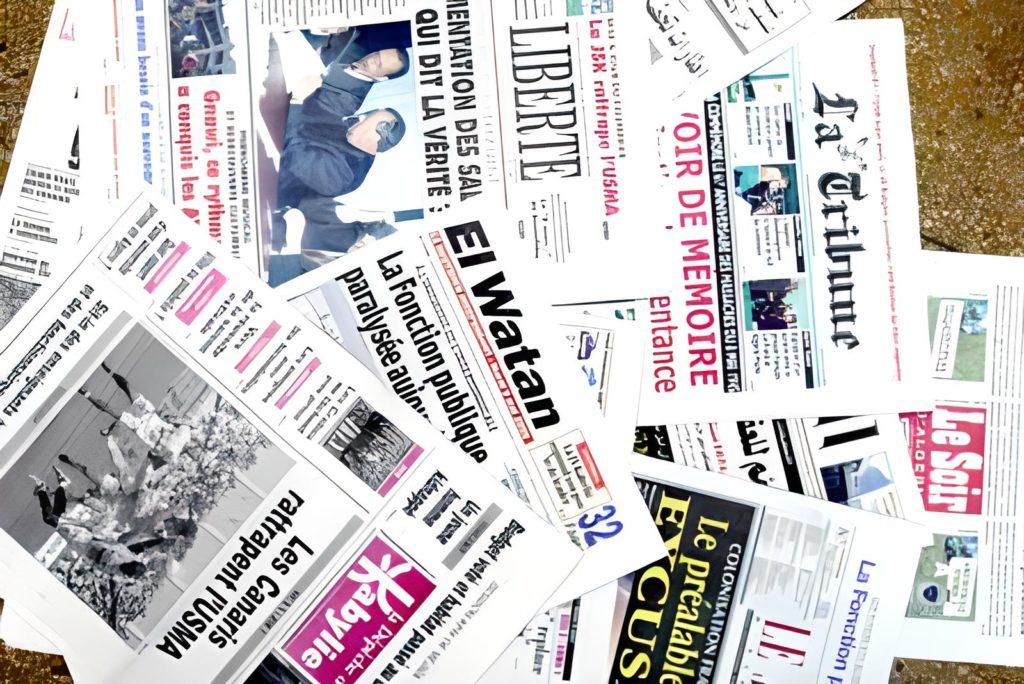This post is also available in: Français (French) العربية (Arabic)
The daily newspaper Le Soir d’Algérie, one of the major outlets of the independent French-speaking press, includes an outdated section called Femme Magazine, which exclusively consists of recipes, beauty tips, and other decoration tips for all activities deemed feminine in nature. It is not so much the editorial choice of devoting an entire page to recipes that stands out, but the fact that it’s assigned to “Women (Femme)”. Maybe the section would have been more egalitarian if it had been called Cuisine.
Another French-language daily, L’Expression, was born in the 2000’s and includes a legal section packed with cliches and sexist stereotypes where the “values” of the strong man are routinely praised. On 18 April 2023, it published the following exchange between a female magistrate and a lawyer: “Then, rolling up the sleeves of his black robe, he exclaimed loudly, with the clear intent of being perfectly heard: ‘Madam President, excuse me, but I must strongly protest against your unpleasant comment which has nothing to do with our profession. If, by any chance, I learned that Madam, my wife, who is president of the chamber in a nearby court, was exhibiting this same behavior, her only option would be to head straight for the kitchen, cook up delicious meals of which only she knows the secrets, and get rid of her black robe.’ His point made, the lawyer withdrew, leaving the judge speechless, unable to come up with the slightest retort.”
And again, in the issue published on 11/03/2023, a male journalist describes a court session in the following terms: “The first one, it’s a big one—a really big one: the father of a family has been, for quite some time now, sexually harassed by a woman who’s more than very ugly, who’s even past her mid-forties. And the victim (was) a handsome, tall boy, slender, like the cowboy actors of the 30’s, dressed in Texas jeans, his angelic face carrying a beautiful salt-and-pepper beard.”
Truth be told, one doesn't need to dig very deep to uncover the sexist bias of the Algerian media when it comes to violence against women
Even on March 8, the official press agency reduced women to the “fairer sex” when reporting on an event dedicated entirely to them: “The show will exhibit a varied selection of products and offers dedicated to the consumption of the fairer sex, namely cosmetics, perfume, jewelry, artisanal productions, household appliances, and ready-to-wear. It will also offer tastings of traditional and modern cakes, with a space for mothers and their children.”
However, these examples seem benign when compared to tabloids and their television channels, such as Echourouk or Ennahar. These two media platforms, which have opted to publish scoops and racist and macho stereotypes, are contributing to further degrading the image of women in society, and this applies even more violently to feminist activists. Their articles about femicides crudely attempt to humanize the aggressors by resorting to extenuating circumstances and, if necessary, the behavior of the victim.
Let’s be the judge of this: “This 50-year-old Algerian man, with no history of domestic violence, explained to investigators that everything was connected to money problems between the couple. On the afternoon of Monday, January 30, when Assia and Lakhdar’s three children were not present, he must have said to his wife: ‘You have to help me out, I can’t manage alone anymore. My salary has been cut in half.’ To which she replied: ‘I don’t care. I don’t have any money.’ Lakhdar then allegedly took his wife’s purse because he could see there was a lot of cash inside.” The aggressor is referred to by his first name and presented as a family man overwhelmed by worries and faced with an insensitive and definitely untrustworthy woman.
Truth be told, one doesn't need to dig very deep to uncover the sexist bias of the Algerian media when it comes to violence against women. The Chaïma affair, the young girl who was raped and burned, revealed the full extent of the potential for misogyny and regressiveness*.
Despite everything, the written press is far less provoking than private television channels. Echourouk TV, for example, very popular among 18-49 year old’s and which has a nearly 41% audience share of the general-interest networks, stood out on 5 July 2020 when it broadcast an episode of a show called “Mon mari est mon paradis (My husband is my paradise)” (sic) during which a woman knelt on set to kiss her husband’s feet, in a demonstration of submission, as the host looked on, delighted.
Public and private media perpetuate a derogatory image of women, characterizing them through the stereotypes of the “good mother,” the authentic Algerian woman respectful of the traditions of the Westernized Algerian woman, resistant to sexist injunctions. However, feminist activism has allowed the issue of violence against women to gradually enter the media’s list of topics, as the term “femicide” has slowly come to replace the infamous “crime of passion”. What remains to be conquered is the way women are advertised, the fictional productions that continue to pigeonhole women as submissive mothers or cantankerous shrews—or worse.
